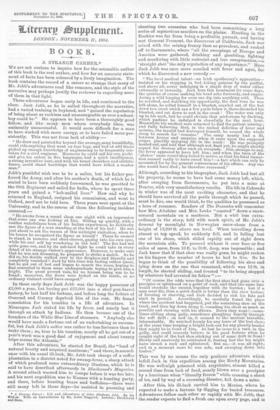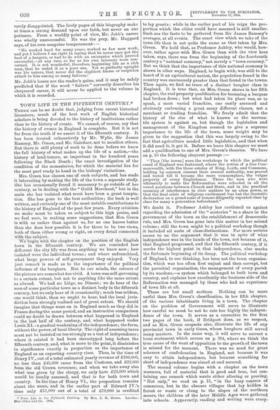BOOKS.
A STRANGE CAREER.* WE are not curious to inquire how far the ostensible author of this book is the real author, and how far an accurate state- ment of facts has been coloured by a lively imagination. The book contains the record of a career so strange that many of Mr. Jebb's adventures read like romance, and the style of the narrative may perhaps justify the reviewer in regarding some of them in that light.
These adventures began early in life, and continued to the close. Jack Jebb, as he is called throughout the narrative, had a varied training in boyhood, and "gained the reputation of being about as reckless and unmanageable as ever a school- boy could be." He appears to have been a thoroughly good fellow, and like many men whom everybody likes, was eminently unsuccesaful. It would seem difficult for a man to have worked with more energy, or to have failed more per- sistently. This was not from lack of ability :— " He drew and painted far beyond the average, sang beautifully, could ride anything that went on four legs, and had at odd times picked up enough knowledge of engineering to be frequently mis- taken for a civil engineer. Moreover he could sail his own yacht. and give his orders in five languages, had a quick intelligence, a strong inventive bent, and with his broad shoulders and atialetic frame, could stand hardships that would have killed a weaker man."
Jebb's youthful wish was to be a sailor, but his father pre- ferred the Army, and after his mother's death, of which he is stated to have been suddenly forewarned, he was gazetted to the 88th Regiment and sailed for India, where he spent three years and gained a "hob-nailed liver." How and why he returned to England, resigned his commission, and went to Oxford, need not be told here. Three years were spent at the University, and in the course of them the following incident occurred:— "He awoke from a sound sleep one night with an impression that some one was looking at him. Sitting up quickly, with a sudden wakefulness born of his Indian experiences, he distinctly saw the figure of a man standing at the foot of his bed ! He was just about to ask the reason of this midnight visitation, when to Ills horror he recognised the figure as himseV There he seemed to stand, in trousers and shirt-sleeves, gazing into his own eyes, while his real self lay wondering in the bed ! The fire had not quite gone out, and by its subdued light he could take in every detail of his strange visitor's appearance. However, to make sure that he was not dreaming, he prepared to strike a match. As he did so, his double walked over to the fireplace and literally and
completely vanished! Jack by this time was feeling rather queer, but he got out of bed and began to search the room, hoping to find concealed in them some undergraduate trying to give him a fright. The quest proved vain, for no human being was to be found ; moreover, the doors were locked on the inside, so no ordinary visitant could have escaped."
In those early days Jack Jebb was the happy possessor of 22,000 a year, but having put 223,000 into a steel gun-barrel factory, he lost half his fortune, and before long the failure of Overend and Gurney deprived him of the rest. He found consolation for his troubles in a life of adventure. In Nicaragua Jack risked his life by fever, and nearly lost it through an attack by Indians. He then became me of the founders of the White Star Line of steamers. "Anybody else would have made a fortune out of an undertaking so success- ful, but Jack Jebb's nx4tier was rather to lose fortunes than to make them ; so, true to his vocation, nearly all he got out of a year's work was a good deal of enjoyment and about twenty trips across the Atlantic."
After this adventure, he started for Brazil, the "land of natural beauty and acquired nastiness ; " and there, in accord- ance with his usual ill-luck, Mr. Jebb took charge of a coffee plantation in a district noted for swamp-fever, a sharp attack of which produced some extraordinary illusions, which he is said to have described afterwards in Blackwood's Magazine, A second attack warned him to escape before it was too late, and his next expedition was to Kansas with a hunting party, and there, before hunting bears and buffaloes—there were still many left in those days—he assisted in pursuing and A Strange Cutler Life and Advonturas of John Otatelin Jebb. By his Widow. With an Introduction by Mr. Bider lin,ggard. London ; Blaokwood and BOW. shooting two assassins who had been committing a long series of mysterious murders on the plains. Hunting in the Rockies was far from being a profitable pursuit, and having met General Fremont, the discoverer of California, Jack was seized with the mining frenzy then so prevalent, and rushed off to Sacramento, where "all the sweepings of Europe and America were gathered, drinking and gambling, fighting and murdering with little restraint and less compunction,—a straight shot ' the only reputation of any importance." Here Jack Jebb was once more assailed with fever and ague, for which he discovered a new remedy :- "The local medical talent—an Irish apothecary's apprentice— insisted on his stopping in bed, taking quinine by the pailful, and above all, never indulging in a single drop of water either outwardly or inwardly. Jack bore this treatment for some days, the quinine of course making his head ache furiously, and engen- dering a wild longing for even one dip into anything cold. Then he revolted, and watching his opportunity, the first time he was left alone, he rolled himself in a blanket, crawled out of the hut down to a creek which ran a few yards below it, there discarded his blanket, and sat down to rest in the creek ! The water was only up to his neck, but he could obviate that misfortune by ducking, which pastime he indulged in cheerfully for the next hour. Meanwhile his medical man returned to find the patient missing ; and fully believing that, in the united delirium of fever and quinine, the invalid had destroyed himself, he roused the whole camp to search for remains.' The camp nearly had a fit,
between horror and surprise, when it came upon the supposed corpse placidly enjoying life in the creek! Ho was promptly hauled out, and told that although not dead yet, he might shortly expect his decease after such an escapade. But, strange to say, the fever appeared to have left him; and when the turn of the 'shakes' came round they failed to arrive, so that his fatal immer- sion seemed really to have cured him I—a fact which can only be accounted for by the general contrariness of his affairs. Any one else would have died ; he therefore recovered."
Although, according to his biographer, Jack Jebb had lost all his property, he seems to have had some money left, which, after escaping from Sacramento, he put into a mine at Denver, with very unsatisfactory results. His life in Colorado in winter was of the most exciting character, and that he should have survived all the perils through which he passed, must be due, one would think, to the qualities he possessed as a hero of romance. Readers of The Dusanges will remember how Mrs. Aleshine and Mrs. Leaks " coasted " down a snow- covered mountain on a mattress. Not a whit less extra- ordinary is the story, told with much spirit, of Mr. Jebb's descent by moonlight in Norwegian snow-shoes from a height of 13,200 ft. above sea level. When travelling down almost at top speed, he suddenly fell, and in falling lost one of his shoes, which elided rapidly out of sight down the mountain side. To proceed without it over four or five miles of snow, from 10 ft. to 30 ft. deep, was impossible ; and Jack knew that if that shoe was really gone, he might reckon on his fingers the number of hours he had to live. So he began to think of the possibility of following his shoe and lying down on the one that remained, which was 12 ft. in length, he started eliding, and. trusted "to its being stopped by whatever had arrested its fellow" "Of course the odds were that the first shoo had gone over a precipice or splintered on a point of rook, and that the same fate would overtake the second, together with its burden ; but if a man vast die, then a quick death is better than the slow torture of freezing or starving, and Jack decided to risk his fate and start in pursuit. Accordingly, he carefully found the place where the accident had happened, put the remaining shoe on the track, and then lay down along it, rounding his chest as much as passible and steering with his elbows. Down they went !—some- times sliding along gaily, sometimes ploughing heavily through the soft drift : on and on, it seemed to the anxious traveller, interminably. He watched keenly for any trace of the lost shoe ; at the same time keeping a bright look-out for any ghastly header that might be in front of him. At last he came to a turn in the gully, and could scarcely believe in his good fortune when he caught sight of the lost shoe sticking out of some drift in front ! Slowly and anxiously he extricated it, fearing lest the toe might have struck a rock and splintered. But no,—it was all right; and in a moment more he was safe, and sweeping down into timber."
This was by no means the only perilous adventure which befell Jack in this expedition among the Rocky Mountains. He was well-nigh poisoned with strychnine, almost killed a second time from lack of food, nearly blown over a precipice by a hurricane when "literally frozen" while crossing a sheet of ice, and by way of a crowning disaster, fell down a mine. After this, his Maack carried him to Mexico, where he expected to make a fortune by digging for buried treasures. Adventures follow each other so rapidly with Mr. Jebb, that the reader expects to find a fresh one upon every page, and is rarely disappointed. The lively pages of this biography make at times a strong demand upon our faith, but never on our patience. From a worldly point of view, Mr. Jebb's career was wholly unsuccessful. He was the prey, Mr. Haggard says, of his own sanguine temperament —
"He worked hard for many yearA, worked as few men work, and yet I believe I am right in saying that he never once got the best of a bargain, or had to do with an enterprise which proved successful,—at any rate, so far as his own interests were con- cerned. It is not wonderful, therefore, beginning life as a rich man, that he ended it as a poor one. Yet so perfectly upright was his nature, that never did the slightest blame or suspicion attach to him among so many failures.'
Mr. Jebb's losses are the reader's gains, and it may be safely predicted that if the word " failure " correctly describes his chequered career, it will never be applied to the volume in which it is recorded.



















































 Previous page
Previous page